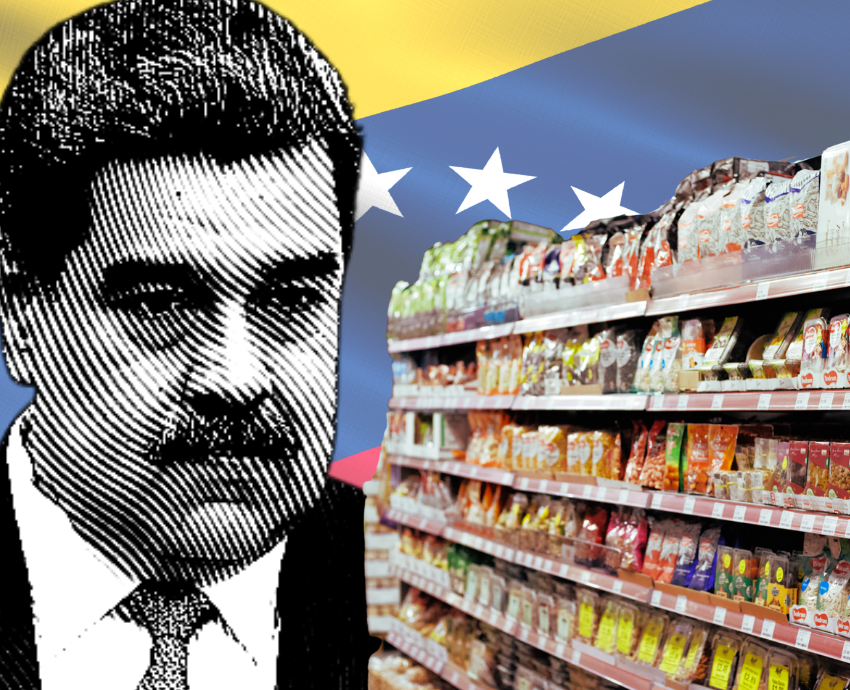
Salvador De León — a member of the Autonomous and Independent Workers’ Committee (CAIT) in Venezuela — spoke to Green Left’s Federico Fuentes about the Nicolás Maduro government’s economic policies.
Debates outside Venezuela focus on blaming US sanctions or the Maduro government for Venezuela’s economic crisis. What is your opinion?
The two have intertwined.
First, it is a fact that sanctions exist, there is a blockade and US imperialism’s policy is to fracture the nation-state.
Imperialism needs to fracture nation-states because the crisis of the globalised capitalist economy requires it to destroy any democratic gains, no matter how small, in order to take control of raw materials.
Our conception of sovereignty is based on people’s ability to exert their self-determination and defend working-class gains within the framework of nation-states.
That is why this is not about defending Maduro. Defending Maduro has never been our central focus; nor have we advocated for the president’s ouster.
We understand that, under attack from imperialism, we must unite forces, whether we like it or not, to defend the integrity of the nation-state.
We do so from the perspective of the 1999 Constitution and all the laws that we, as the working class, have won since then.
The sanctions clearly have significantly affected the economy — the numbers speak for themselves. Ultimately, it is the working class who have been affected, not those in power or their governability.
But we also have the government’s poor economic decisions. They chose not to more effectively redistribute oil revenues through greater state planning, as others proposed.
So, there was a debate about what direction the government should take?
In 2017, President Maduro announced his proposal for an Economic Recovery, Growth, and Prosperity Program.
Throughout that year, there was a debate among the grassroots, where certain left critics, such as María Alejandra Diaz, Pasqualina Curcio, Tony Boza and other comrades, put forward proposals to ensure the vast majority were protected from the crisis.
They said: yes, there is a crisis and a blockade, but we can obtain funds through policies such as taxes on large transactions and the banks, to give a few examples.
Other comrades put forward different proposals, such as Jesús Farías, who ended up spearheading the program that was ultimately implemented — a program based on deregulation, free market policies and all the usual capitalist formulas.
They argued fixing the economy required recreating conditions to attract foreign investment.
Amid the internal crisis and [government decreed] state of emergencies, they enacted the Law on Foreign Investment, the Anti-Blockade Law and other laws that, ultimately, promoted the free market and deregulation.
Since then, we have had an economic recovery, but in capitalist terms. There has been economic growth, but Venezuela in 2025 is not the same as Venezuela in 2017.
This is obvious when you go to a supermarket, where you can get whatever you want, but have to buy stuff on a pulverised salary and in a de facto dollarised economy.
The economy is moving, unlike in 2017, but workers’ living standards are more precarious.
In the private sector, business groups are protected while anti-labour counter-reforms are increasingly likely.
The few gains left face many threats. We are on the defensive, not the offensive. The situation has changed.
So, many elements came together. On the one hand, there is the blockade, there was a systematic economic war waged by the national capitalist class.
But, on the other hand, the government lacked the political will, or rather shifted its policy toward more deregulation, more free market and more policies in tune with the requirements of the globalised capitalist economy.
The main big business organisation, Fedecámaras, along with other business federations, has abandoned its oppositional stance and begun to collaborate and even support the Maduro government. How did this happen?
Fedecámaras emerged in 1944, a year after then-President Isaías Medina Angarita publicly declared that no more money would be given to national business owners.
Historically, the state has used oil revenue to finance the capitalist class, in the hope that this would help develop national industry. Instead, it led to the creation of a parasitic capitalist class.
Fedecámaras was formed to defend these capitalists, and continues to defend those interests today.
When Chávez came to power, Fedecámaras immediately openly opposed his government.
It took part in the 2002–03 oil industry lockout and promoted various coup attempts, because its underlying objective has always been defending the interests of the business community.
Once the government started implementing its policy of paying public sector salaries through non-salary bonuses, Fedecámaras saw the state doing what it had always wanted.
The Economic Recovery Program contained two important measures for the public sector: Memorandum 2792, which suspended all collective bargaining agreements; and the ONAPRE Instruction, which flattened national pay scales.
This is what Fedecámaras was proposing for the private sector. Add the government’s bridge-mending efforts to attract investment, [and] we can clearly see a rapprochement with the national business community.
Would you say the government’s economic policy is neoliberal?
The government has been adapting its policies to the demands of the globalised capitalist economy.
I do not know if the best term is neoliberal. What we have, in economic and pragmatic terms, is opening up of the free market and deregulation.
Under the pretext of the crisis, the state’s policy is that we need to attract investment to boost the economy — which has occurred, but in capitalist terms.
The national market has rebounded, businesses have reopened, there are more business owners, etc.
Where I live, Maracaibo, you can find new pharmacy chains, new supermarket chains, but with workers on precarious contracts outside the protective framework of the Labour Law and Constitution.